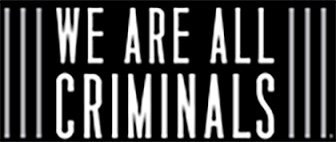Press
KQED
Brainerd Dispatch
The Cap Times
Milwaukee Journal Sentinel
The project’s ability to go beyond the statistics resonated with Madison corporate attorney Shobhan Thakkar, who worked to bring Baxter to Wisconsin after he heard her speak at a conference in Orlando two months ago.
“[We Are All Criminals] made us all think about what we’ve done and how lucky we have all been compared to the unfortunate ones and what happened to them,” he said. “It makes you think about how life could be very different.”
Australia’s Radio National, The Law Report
Michael Santos’ Earning Freedom Podcast
Boston College’s The Gavel
Once we graduate and grow up, we will probably think of our crimes as funny college memories. We won’t pause to think that if we had been caught even once, our promising careers in business, law, or medicine might not have been possible. When we hear about a convict on the news, we won’t pause to think. We will thank the American criminal justice system for keeping our families safe every day and ignore the fact that, for each bona fide criminal that is locked up, many more people are permanently punished for minor mistakes.
I challenge you to think and act instead of ignore. If the injustice of it all doesn’t make you want to take action, remember that by some twist of fate, it could be you behind bars one day, the mark of ‘criminal’ on your record for the rest of your life.
Times-Picayune NOLA
We are criminalizing more and more behavior: not just things we abhor, but things we find abnormal.
People who have been convicted of a serious crime have every reason to believe that their punishment will be interminable. For the simple fact that they’re now labeled a criminal.
We Are All Criminals is trying to push us toward a more humane and a more empathetic way of responding to people who – just like the rest of us – have done wrong.
“There has to be an end,” Baxter said. “There has to be hope.”
The University News
The present situations in St. Louis and Ferguson force the SLU community to sort through these types of issues, up close and personal. “We Are All Criminals” hit close to home. Sharing stories, experiences and participating in dialogues help everyone achieve their civic potential. Humans have the ability to change, only when grace and the pursuit of truth are also present, too. Baxter’s project promotes working together, and improving justice systems and challenging questions that society faces today.
TakePart
Minnesota Daily
Against the Grain
Sambal (Belgium)
ProBonoPress
b Magazine
Thomson Reuters’ Legal Current
Upworthy
“What comes to mind when you think of a criminal? Really, take a minute to imagine it. I’ll be here when you’re ready…
[crickets]All right, so what did you come up with? Any chance it was yourself? I’m not trying to call you a bad person, but I’d be willing to bet you’ve committed a crime or two in your day. Whether you were caught is another matter entirely. Take a look at the photos below … what would your sign say?”
University of St Thomas, Newsroom
“Too many people currently are prohibited from reaching their full potential. We must create a road to redemption for our neighbors, friends, colleagues and strangers. The first step in doing so is recognizing that we’re not all that different.”
The Yale Herald
“commonality means humanization means destigmatization”
Yale Daily News
Marianne Combs at Minnesota Public Radio’s State of the Arts
“To persuade others that they should give people convicted of crimes a second chance, Baxter is employing an interesting argument.”
ABA Access to Justice blog
Pacific Standard
National Journal
Andrew Sullivan’s The Dish
“Ever break the law? A Minnesota attorney is soliciting confessions.”
Smithsonian Magazine
“Have you ever committed a crime? Stop lying: you almost definitely have… [WAAC’s] point is less that we’re all bad people, and more that those who are caught aren’t really all that worse than the rest of us.”
Sociological Images
“By emphasizing the crimes of the unconvicted, Baxter blurs the lines between criminal and noncriminal and draws attention to the detrimental effects that a criminal record has on the lives of those who are convicted.”
Argus Leader
“It is, at its core, about second chances, Baxter says, and putting yourself in someone else’s shoes. No matter how uncomfortably they fit.”
Written by Jill Callison; Reprinted with permission from the Sioux Falls Argus Leader
The Society Pages
“The most intriguing part of [the] project lies in its look at society as a whole. Imagine if we had all been prosecuted for every crime we committed, even as a juvenile. What would the crime rate look like then?”
Chris Uggen
“Few (if any) of us have abstained from crime completely. And recognizing our own criminality is often an important first step in understanding the situation of those who are caught and punished for crimes.”
Minnesota Sentencing Solutions
“Think for a moment about the incredible power a criminal record has over every aspect of one’s life.”
Star Tribune
“You haven’t ever committed a crime? Keep thinking.”

